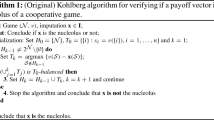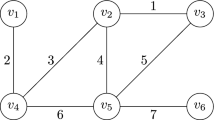Abstract
We study the computational complexity of the existence and the verification problem for wonderfully stable partitions (WSPE and WSPV) and of the existence problem for strictly core stable coalition structures (SCSCS) in enemy-oriented hedonic games. In this note, we show that WSPV is NP-complete and both WSPE and SCSCS are DP-hard, where DP is the second level of the boolean hierarchy, and we discuss an approach for classifying the latter two problems in terms of their complexity.
Similar content being viewed by others
References
Aziz, H., Brandt, F., Seedig, H.: Computing desirable partitions in additively separable hedonic games. Artif. Intell. 195, 316–334 (2013)
Baumeister, D., Brandt, F., Fischer, F., Hoffmann, J., Rothe, J.: The complexity of computing minimal unidirectional covering sets. Theory of Computing Systems 53(3), 467–502 (2013)
Beigel, R.: Bounded queries to SAT and the boolean hierarchy. Theor. Comput. Sci. 84(2), 199–223 (1991)
Beigel, R., Hemachandra, L., Wechsung, G.: On the power of probabilistic polynomial time: \(\mathrm {P^{NP[log]}}\subseteq PP\). In: Proceedings of the 4th Structure in Complexity Theory Conference, pp 225–227. IEEE Computer Society Press, June (1989)
Brams, S., Fishburn, P. In: Arrow, K., Sen, A., Suzumura, K. (eds.) : Handbook of Social Choice and Welfare, volume 1, pages 173–236. North-Holland (2002)
Brandt, F., Conitzer, V., Endriss, U. Computational social choice. In: Weiß, G. (ed.) : Multiagent Systems, pp 213–283. MIT Press, second edition (2013)
Cai, J., Gundermann, T., Hartmanis, J., Hemachandra, L., Sewelson, V., Wagner, K., Wechsung, G.: The boolean hierarchy I: Structural properties. SIAM J. Comput. 17(6), 1232–1252 (1988)
Cai, J., Gundermann, T., Hartmanis, J., Hemachandra, L., Sewelson, V., Wagner, K., Wechsung, G.: The boolean hierarchy II: Applications. SIAM J. Comput. 18(1), 95–111 (1989)
Chalkiadakis, G., Elkind, E., Wooldridge, M.: Computational Aspects of Cooperative Game Theory. Synthesis Lectures on Artificial Intelligence and Machine Learning. Morgan and Claypool Publishers (2011)
Chang, R., Kadin, J.: On computing boolean connectives of characteristic functions. Mathematical Systems Theory 28(3), 173–198 (1995)
Dimitrov, D., Borm, P., Hendrickx, R., Sung, S.: Simple priorities and core stability in hedonic games. Soc. Choice Welf. 26(2), 421–433 (2006)
Garey, M., Johnson, D.: Computers and Intractability: A Guide to the Theory of NP-Completeness. W. H, Freeman and Company (1979)
Hemachandra, L.: The strong exponential hierarchy collapses. J. Comput. Syst. Sci. 39(3), 299–322 (1989)
Hemaspaandra, E., Rothe, J.: Recognizing when greed can approximate maximum independent sets is complete for parallel access to NP. Inf. Process. Lett. 65(3), 151–156 (1998)
Hemaspaandra, E., Hemaspaandra, L., Rothe, J.: Exact analysis of Dodgson elections: Lewis Carroll’s 1876 voting system is complete for parallel access to NP. J. ACM 44(6), 806–825 (1997a)
Hemaspaandra, E., Hemaspaandra, L., Rothe, J.: Raising NP lower bounds to parallel NP lower bounds. SIGACT News 28(2), 2–13 (1997b)
Hemaspaandra, E., Spakowski, H., Vogel, J.: The complexity of Kemeny elections. Theor. Comput. Sci. 349(3), 382–391 (2005)
Hemaspaandra, E., Rothe, J., Spakowski, H.: Recognizing when heuristics can approximate minimum vertex covers is complete for parallel access to NP. R.A.I.R.O. Theoretical Informatics and Applications 40(1), 75–91 (2006)
Karp, R. Reducibility among combinatorial problems. In: Miller, R., Thatcher, J. (eds.) : Complexity of Computer Computations, pp 85–103. Plenum Press (1972)
Köbler, J., Schöning, U., Wagner, K.: The difference and truth-table hierarchies for NP. R.A.I.R.O. Informatique théorique et Applications 21, 419–435 (1987)
Meyer, A., Stockmeyer, L.: The equivalence problem for regular expressions with squaring requires exponential space. In: Proceedings of the 13th IEEE Symposium on Switching and Automata Theory, pages 125–129. IEEE Computer Society Press (1972)
Nguyen, N., Nguyen, T., Roos, M., Rothe, J.: Computational complexity and approximability of social welfare optimization in multiagent resource allocation. Journal of Autonomous Agents and Multi-Agent Systems 28(2), 256–289 (2014)
Papadimitriou, C., Yannakakis, M.: The complexity of facets (and some facets of complexity). J. Comput. Syst. Sci. 28(2), 244–259 (1984)
Papadimitriou, C., Zachos, S.: Two remarks on the power of counting. In: Proceedings of the 6th GI Conference on Theoretical Computer Science, pages 269–276. Springer-Verlag Lecture Notes in Computer Science #145 (1983)
Peleg, B., Sudhölter, P.: Introduction to the theory of cooperative games. Kluwer Academic Publishers (2003)
Reisch, Y., Rothe, J., Schend, L.: The margin of victory in Schulze, cup, and Copeland elections: Complexity of the regular and exact variants. In: Proceedings of the 7th European Starting AI Researcher Symposium, pp 250–259. IOS Press, August (2014)
Riege, T., Rothe, J.: Completeness in the boolean hierarchy: Exact-Four-Colorability, minimal graph uncolorability, and exact domatic number problems – a survey. Journal of Universal Computer Science 12(5), 551–578 (2006)
Rothe, J., Spakowski, H., Vogel, J.: Exact complexity of the winner problem for Young elections. Theory of Computing Systems 36(4), 375–386 (2003)
Schaefer, M., Umans, C.: Completeness in the polynomial-time hierarchy: Part I: A compendium. SIGACT News 33(3), 32–49 (2002a)
Schaefer, M., Umans, C.: Completeness in the polynomial-time hierarchy: Part II. SIGACT News 33(4), 22–36 (2002b)
Stockmeyer, L.: The polynomial-time hierarchy. Theor. Comput. Sci. 3(1), 1–22 (1976)
Sung, S., Dimitrov, D.: On core membership testing for hedonic coalition formation games. Oper. Res. Lett. 35(2), 155–158 (2006)
Sung, S., Dimitrov, D.: Computational complexity in additive hedonic games. Eur. J. Oper. Res. 203(3), 635–639 (2010)
Wagner, K.: More complicated questions about maxima and minima, and some closures of NP. Theor. Comput. Sci. 51, 53–80 (1987)
Wagner, K.: Bounded query classes. SIAM J. Comput. 19(5), 833–846 (1990)
Woeginger, G.: Core stability in hedonic coalition formation. In: Proceedings of the 39th Conference on Current Trends in Theory and Practice of Computer Science, pages 33–50. Springer-Verlag Lecture Notes in Computer Science #7741 (January 2013a)
Woeginger, G.: A hardness result for core stability in additive hedonic games. Math. Soc. Sci. 65(2), 101–104 (2013b)
Author information
Authors and Affiliations
Corresponding author
Rights and permissions
About this article
Cite this article
Rey, A., Rothe, J., Schadrack, H. et al. Toward the complexity of the existence of wonderfully stable partitions and strictly core stable coalition structures in enemy-oriented hedonic games. Ann Math Artif Intell 77, 317–333 (2016). https://doi.org/10.1007/s10472-015-9461-y
Published:
Issue Date:
DOI: https://doi.org/10.1007/s10472-015-9461-y




